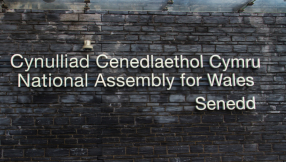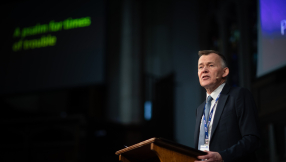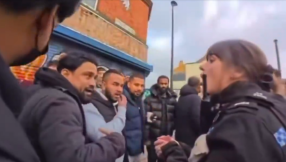When Pope Francis and the Archbishop of Canterbury Justin Welby join in prayer at vespers, or evening prayers, in San Gregorio al Celio church in Rome, this will mark another step towards unity between Anglicans and Catholics.
They will literally be singing from the same hymn sheet, with the Sistine Chapel Choir joined by the choir of Canterbury Cathedral.
Events in Rome this week appear to show Catholics and Anglicans, under these two remarkably similar prelates, Pope Francis and Archbishop Welby, could be inching closer.
They are already "85 per cent" there, according to the Archbishop who heads the Anglican Centre in Rome.
But there is a price to pay and it was witnessed in the Pope's visit to Georgia this week. He was snubbed by the Orthodox Church, offended by his apparently liberal attitudes to gays.
Pictures emerged of a stadium of empty seats as Pope Francis celebrated Mass.
The path that Anglican-Catholic unity might take one day was envisaged by a radical 2007 document, Growing Together in Unity and Mission.
The document, produced by the International Anglican-Roman Catholic Commission for Unity and Mission (IARCCUM), is a "call for action" for Catholics and Anglicans to engage jointly in Christian mission, from the pews upwards.
This is relevant again today because 38 bishops - 19 Catholics and 19 Anglicans - invited by IARCCUM have been meeting this week in Canterbury.
Yesterday they flew to Rome, and for the rest of this week they are there.
They will be modelling the great commission to the disciples of Christ.
They will themselves be commissioned in pairs to go forward in mission to advance the Gospel.
This will be the high point of a high-level conference marking the 50th anniversary of the Anglican Centre in Rome at which top Church of England theologians such as Paula Gooder will be speaking.
Underpinning it all with prayer will be the Archbishop of Canterbury's community of St Anselm, the young adults who have given up a year of their lives to live as monks and nuns at Lambeth Palace. They have flown to Rome to be with him and the bishops.
The Protestant Church of England came into being in 1534 when King Henry VIII realised the only way he could annul his marriage to Catherine of Aragon and marry Anne Boleyn was to make himself Supreme Head of the Church in England, thus ensuring his excommunication by Rome.
How to treat Catholics who wish to remarry after divorce remain a highly contentious issue in the Catholic Church.
Traditionalists are resisting apparent attempts by Pope Francis to be merciful to such Catholics and admit them to communion.
But as in the Anglican Communion it is the LGBT issues which are at the fore of current difficulties.
Pope Francis is trying to witness well to gay people, having famously said on a Papal plane early in his papacy: "Who am I to judge them if they're seeking the Lord in good faith?"
He has however been critical of gender theory and what he describes as "colonisation" by ideology.
Flying back to Rome on Sunday after his visit to Georgia and Azerbaijan, he was asked on the Papal plane how he would provide pastoral care to a transexual.
According to Catholic News, Pope Francis said he had as a priest "accompanied people with homosexual tendencies and even homosexual activity. I accompanied them; I helped them draw closer to the Lord, although some couldn't. But I never abandoned them."
But then he pleaded with the journalists: "Please, don't say, 'The pope will bless transgender people,' OK?"
This was hours after he had been openly snubbed by the Orthodox Church in Georgia which stayed away from Mass in a stadium inTbilisi. Al-Jazeera reported that the local patriarchate had declined to take part because of "dogmatic differences".
When Archbishop Welby has his private audience with Pope Francis on Thursday at the Vatican, it would be surprising if they did not discuss this issue.
In this at least they are united: both men are leaders of churches whose doctrine puts them at odds with the secular laws of their countries that permit gay marriage.
Closer ties with other churches and faiths are a priority for both the Archbishop and the Pope but neither is blind to the difficulties.
In 597, the prior of the monastery church of San Gregorio, where tomorrow's Vespers will be held, was St Augustine.
That was the year he was sent by the Pope to evangelise England.
Only last year San Gregorio sent its ancient relic, the head of the crozier of St Gregory the Great, to Canterbury for the Primates' Meeting that attempt to begin to resolve the Anglican Communion's own difficulties over its mission to gay Christians.
The relic was intended as a symbol of prayer and support for the Archbishop and the Anglican Communion.
Let's hope it is effective in helping the churches to work together to resolve their differences with secular society as well as among themselves.
To build churches full of people, all made in the image of God.
Not sad and empty ones like the stadium in Georgia, a witness, if ever there was one, to not-so-good disagreement.













